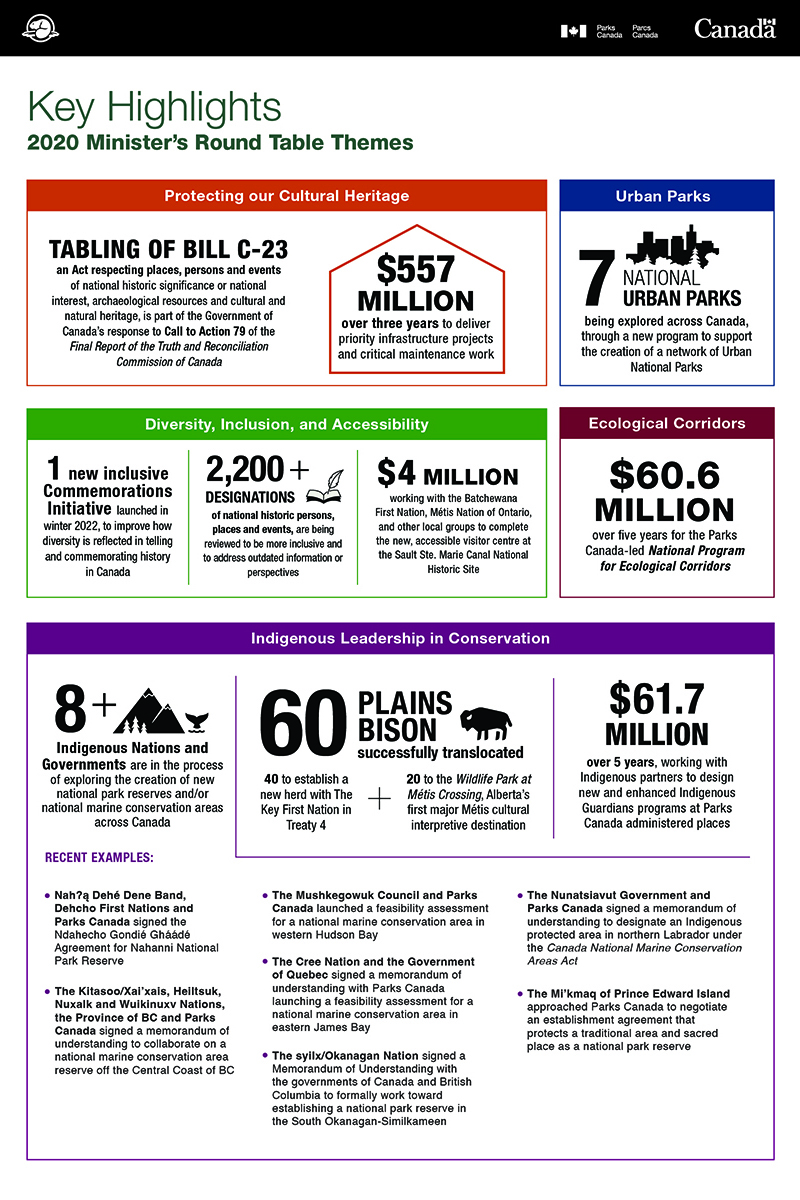Progress Highlights - 2023 Minister’s Round Table on Parks Canada

Title: Progress Highlights - 2023 Minister’s Round Table on Parks Canada
Organization: Parks Canada Agency
Table of contents
- Introduction
- Message from the Minister
- Message from the President & Chief Executive Officer
- Key Highlights
- Highlights on Nature Conservation
- Highlights on Heritage Conservation
- Highlights on Working with Indigenous Partners
- Highlights on Connecting Canadians and Visitor Experience
- Highlights on Improving Diversity, Inclusion, and Accessibility
Introduction

Every two years, the Minister responsible for the Parks Canada Agency holds a round table to seek advice from Canadians on the work of Parks Canada, and to share information on progress and developments since the previous engagement.
The Minister’s Round Table is required by the Parks Canada Agency Act (1998) and is an important opportunity for dialogue with Canadians on a wide range of issues related to national historic sites, national parks and naional marine conservation areas.
The 2020 Minister’s Round Table, Let’s Talk Parks, Canada! was held in October 2020. Over 13,000 participants online and 60 stakeholder organizations (through nine virtual discussions) shared their perspectives on the work of Parks Canada throughout the engagement.
Here are some highlights on the progress Parks Canada has made in advancing its mandate and the five 2020 Minister’s Round Table key themes: Ecological corridors; Protecting our cultural heritage; Indigenous leadership in conservation; Urban parks and Diversity, inclusion, and accessibility, that have helped shape the themes for the 2023 Minister’s Round Table.
Message from the Minister

Minister of Environment and Climate Change
As the Minister responsible for the Parks Canada Agency, I am delighted to share the progress made by Parks Canada in a variety of areas relating to the 2020 Minister’s Round Table on Parks Canada.
The 2020 Minister’s Round Table was held at the height of the COVID-19 pandemic, a time of great uncertainty for Canadians. Yet the pandemic also served as a crucial reminder of how important our protected heritage places are to our physical, mental and social wellbeing and to the health of our communities.
Parks Canada has made great progress since that time. This includes concrete progress in each of the major themes explored at the 2020 Round Table: ecological corridors; protecting our cultural heritage; Indigenous leadership in conservation; urban parks; and diversity, inclusion, and accessibility.
For example, last April in Laval, Québec, Parks Canada launched a new National Program for Ecological Corridors, which will connect protected and conserved places to promote healthy functioning ecosystems within a changing climate.
In 2021, Parks Canada launched efforts to create a new network of national urban parks – an exciting opportunity to strengthen conservation in cities and improve access to nature for millions of Canadians.
As part of the government’s commitment to reconciliation, we recently expanded our investments to Indigenous Guardians programs at Parks Canada-administered places across the country. These Guardians play a vital role in protecting the ice, lands, waters and oceans that they call home.
And finally, the government tabled Bill C-23, landmark legislation that will help ensure that Canada’s historic places represent the whole of Canada’s story, including the lived experiences of Indigenous peoples, youth and members of diverse groups across the country.
As we continue to scale our efforts to address the challenges of our time - including climate change and biodiversity loss - these advances give me great hope for a brighter future together. I look forward to building on this vital work at the 2023 Minister’s Round Table.
Message from the President & Chief Executive Officer

President & Chief Executive Officer
Parks Canada Agency
As we begin a new calendar year, there is a natural inclination toward reflection – of our work, our learnings and our successes – and so, I am very pleased to present the progress highlights from the 2020 Minister’s Round Table on Parks Canada.
The Minister’s Round Table offers a regular opportunity for people interested in the work of Parks Canada to share their perspectives while also discussing Parks Canada’s progress in the fulfillment of its important mandate to protect and present Canada’s national heritage places.
The 2020 Minister’s Round Table underscored the need to enhance the diversity, inclusion and accessibility of Parks Canada places, and called for more proactive collaboration in advancing these efforts. We have taken this to heart, launching a new inclusive Commemorations initiative and reviewing more than 2000 heritage designations to ensure our storytelling reflects the diverse and shared histories of Canada.
We have also made concrete progress on each of the other key themes explored in the 2020 Round Table and we look forward to building on these efforts in 2023 and beyond.
I also want to acknowledge the extraordinary work of Parks Canada team members who, over the past two years, went to extraordinary efforts to serve Canadians, protect and present Canada’s national heritage treasures, and helped millions of Canadians find opportunities for connection and wellbeing throughout the pandemic.
Moving into 2023, as we continue work to address the increasing global impacts of climate change and biodiversity loss, spaces for public dialogue, such as the Minister’s Round Table, are critical to ensure that Parks Canada’s efforts reflect the perspectives of all Canadians.
Key Highlights on the 2020 Minister’s Round Table Themes
Protecting our Cultural Heritage
Tabling of Bill C-23 an Act respecting places, persons and events of national historic significance or national interest, archaeological resources and cultural and natural heritage, is part of the Government of Canada’s response to Call to Action 79 of the Final Report of the Truth and Reconciliation Commission of Canada
$557 Million over three years to deliver priority infrastructure projects and critical maintenance work
Urban Parks
7 National urban parks being explored across Canada, through a new program to support the creation of a network of Urban National Parks
Diversity, Inclusion, and Accessibility
1 new inclusive Commemorations Initiative launched in winter 2022, to improve how diversity is reflected in telling and commemorating history in Canada
2,200+ Designations of national historic persons, places and events, are being reviewed to be more inclusive and to address outdated information or perspectives
$4 Million working with the Batchewana First Nation, Métis Nation of Ontario, and other local groups to complete the new, accessible visitor centre at the Sault Ste. Marie Canal National Historic Site
Ecological Corridors
$60.6 Million over five years for the Parks Canada-led National Program for Ecological Corridors
Indigenous Leadership in Conservation
8+ Indigenous Nations and Governments are in the process of exploring the creation of new national park reserves and/or national marine conservation areas across Canada
60+ Plains Bison successfully translocated
- 40 to establish a new herd with The Key First Nation in Treaty 4 +
- 20 to the Wildlife Park at Métis Crossing, Alberta’s first major Métis cultural interpretive destination
$61.7 Million over 5 years, working with Indigenous partners to design new and enhanced Indigenous Guardians programs at Parks Canada administered places
Recent examples:
- Nahʔą Dehé Dene Band, Dehcho First Nations and Parks Canada signed the Ndahecho Gondié Gháádé Agreement for Nahanni National Park Reserve.
- The Kitasoo/Xai’xais, Heiltsuk, Nuxalk and Wuikinuxv Nations, the Province of BC and Parks Canada signed a memorandum of understanding to collaborate on a national marine conservation area reserve off the Central Coast of BC.
- The Mushkegowuk Council and Parks Canada launched a feasibility assessment for a national marine conservation area in western Hudson Bay.
- The Cree Nation and the Government of Quebec signed a memorandum of understanding with Parks Canada launching a feasibility assessment for a national marine conservation area in eastern James Bay.
- The syilx/Okanagan Nation signed a Memorandum of Understanding with the governments of Canada and British Columbia to formally work toward establishing a national park reserve in the South Okanagan-Similkameen.
- The Nunatsiavut Government and Parks Canada signed a memorandum of understanding to designate an Indigenous protected area in northern Labrador under the Canada National Marine Conservation Areas Act.
- The Mi’kmaq of Prince Edward Island approached Parks Canada to negotiate an establishment agreement that protects a traditional area and sacred place as a national park reserve.
Highlights on Nature Conservation
The first Joint Statement on Climate Change and Biodiversity was signed by Parks Canada and protected and conserved areas around the world
40 wood bison translocated to Alaska, to support the establishment of conservation herds across North America
353 Parks Canada staff deployed
- 188 team members deployed across Canada in 2021 & 2022 to collaborate and assist with managing wildfires in other jurisdictions
- 165 team members deployed across Parks Canada places in 2022 to assist with natural disasters including fires and hurricanes
Negotiating a memorandum of understanding to assess the feasibility of a South Coast Fjords national marine conservation area in the Burgeo region of Newfoundland and Labrador
Important Investments Include:
$682,000
to protect habitat and research wild horse ecosystem influence on Sable Island National Park Reserve
Up to $24 million
to support woodland caribou recovery in Jasper National Park
$14.7 million
over five years, to prevent and manage aquatic invasive species in Banff, Jasper, Kootenay, Waterton Lakes and Yoho national parks
$4.3 million
to conserve, restore and present the beaver pond ecosystem, of Forillon National Park
$87 million Canada has made an unprecedented investment of over $87 million to implement federal commitments under the Wood Buffalo National Park and World Heritage Site Action Plan in which over two-thirds of the 138 actions are completed or underway.
Highlights on Heritage Conservation
5100 + stones replaced or repaired to complete the most extensive renovation to Province House National Historic Site in 174 years
25 million artifacts will be safeguarded for future generations once construction is complete on Parks Canada’s new artifact collection facility
Collaborating on research with the Inuit Guardians Parks Canada’s Underwater Archaeology Team is returning to the wrecks of HMS Erebus and HMS Terror National Historic Sites
UNESCO’s Heritage Emergency Fund, supported by Parks Canada, Canadian Heritage and the Canada Council for the Arts, through a $4.8 million contribution, for global heritage conservation that is actively supporting the Ukraine
175th anniversary of the Irish tragedy of 1847 at Grosse Île and the Irish Memorial National Historic Site commemorated by the Government of Canada and the Ambassador of Ireland
Important Investments Include:
$5.6 million
for a major restoration of the heritage buildings at Manoir Papineau National Historic Site
$2.6 million
for Fort Wellington National Historic Site
$613,000
at the Forges du Saint-Maurice National Historic Site
Highlights on Working with Indigenous Partners
Indigenous Tourism Association of Canada and Parks Canada, signed a Memorandum of Understanding to renew their partnering arrangement for 2022-2025
The Mohawk Council of Akwesasne, the Township of South Glengarry, and Parks Canada announced a collaboration on a common vision for conserving the natural and cultural heritage, and sharing the stories of Tsikatsinakwahere, or Cairn Island, on the St. Lawrence River
Launch of a travelling exhibit Lii Buflo: A Métis Way of Life, showcasing the history of the Métis peoples and their relationship with bison developed by a Métis advisory committee, the Arts and Heritage Foundation of St. Albert and Parks Canada
690 hectares of land transferred from Parks Canada to the Métis Nation of Saskatchewan
Wolastoqiyik Wahsipekuk First Nation and Parks Canada announced the ratification of a Reconciliation and Rights Recognition Agreement, to encourage and increase the First Nation’s participation in Parks Canada activities on the Wolastokuk, the traditional territory of the Wolastoqiyik
Working collaboratively to recognize, commemorate, and share Indigenous histories.
Recent Examples:
- 25 million over three years, starting in 2022-23, to support the commemoration and memorialization of former residential school sites
- Recognition of the Residential School System, as a tragic and defining event in Canadian history marked by 2 former residential school sites in 2020.
- former Portage La Prairie Indian Residential School in Manitoba, and
- former Shubenacadie Indian Residential School in Nova Scotia.
- Two former residential school sites recognized as national historic sites in April 2021:
- former Shingwauk Indian Residential School in Ontario, and
- former Muscowequan Indian Residential School in Saskatchewan.
- The ancient village of Mehtawtik (Meductic), the principal settlement of the Wəlastəkokewiyik from before the 17th century in what is now New Brunswick is now recognized as a national historic site
- Nahnebahwequay (1824-1865), a Mississauga advocate who fought against colonial policies that drove Indigenous people from their lands, is now recognized as a national historic person
Honouring Place Names:
- Parks Canada and the W ̱ SÁNEĆ First Nations are working to rename a campground in Gulf Islands National Park Reserve from “McDonald” to “SMONEĆTEN”.
- The Advisory Group of the Jasper Indigenous Forum composed of over 25 First Nations and Métis groups and Parks Canada announced the selection of “Miette” as an interim step in the renaming of a campground.
- Parks Canada, La Société Saint-Pierre and the Parks Canada-Unama’ki Advisory Committee, unveiled the name of a new campground in Cape Breton Highlands National Park, “Terrain de Camping Cap-Rouge / Mkwesaqtuk Campground”.
Highlights on Connecting Canadians and Visitor Experience
Launched an expert panel to advise on the development of a long-term framework for the sustainable movement of visitors in the Bow Valley in Banff National Park
25-kilometre pathway, ʔapsčiik t ̓ašii, in the ḥaaḥuułi, the traditional territories and homelands of the Tla-o-qui-aht First Nation and YuułuɁiłɁatḥ First Nations, was completed in Pacific Rim National Park Reserve
5 national parks launched a citizen-centred research project, the Coastie Initiative, with the University of Windsor to help monitor coastal change over time
PaRx, Canada’s first national nature prescription program, led by the BC Parks Foundation and supported by Parks Canada through a 3-year Partnering Agreement to help improve patient health by time spent in nature
Official opening, of the new Waterton Lakes National Park Visitor Centre. Materials were collaboratively developed with Indigenous partners from Káínai and Piikáni Nations to help honour Paahtómahksikimi – inner sacred lake in the mountains – now Waterton Lakes National Park
Important Investments Include:
- Close to $80 million to complete the renewal and reopening of three campgrounds in Jasper National Park, Waterton Lakes National Park and Kejimkujik National Park
- $8.7 million towards the design work and first phase of reconstruction for Waterton Lakes National Parks’s Crandell Mountain Campground
- $1.16 million to rehabilitate critical assets damaged by post-tropical storm Dorian to Kejimkujik National Park
- $10 million to renew the Visitor Centre in Gros Morne National Park
- $12.9 million through a five-year contribution agreement between the Bow Valley Regional Transit Service Commission and Parks Canada to help reduce emissions in Banff National Park
- $4 million to improve the Lomond Campground, Day Use Area and three major trails in Gros Morne National Park
- $700,000 to design, construct and reengineer Tobey Dock in Georgian Bay to be climate resilient
- $8 million for public engagement and planning towards re-development in the 200-block of Banff Avenue in support of visitor reception, orientation and education services
- $300 million in infrastructure renewal and upgrades in Jasper National Park and along the Icefields Parkway, including the $60 million redevelopment of Whistler’s Campground – Parks Canada’s largest campground
Highlights on Improving Diversity, Inclusion, and Accessibility
The creation of a Values, Ethics, Diversity and Inclusion Directorate at Parks Canada, that provides key oversight in efforts to combat systemic racism and discrimination in pursuit of greater equity, diversity, inclusion and accessibility, in the workplace and in public programming
Field test and evaluate a variety of adaptive equipment, through a pilot project to increase accessibility at Parks Canada places
Award of Excellence, provided to Parks Canada from the Canadian Parks Council for ensuring equitable and inclusive access to washrooms for all employees and visitors through the development and implementation of the 2021 Directive on Inclusive Sanitary Facility Design
40+ people, places and events have received designations of national historic significance that reflect the importance of Black history, people, places and events in Canada, including:
Viola Desmond (1914–1965) – an African Canadian business woman who brought national attention to the struggle for equal rights after being arrested for sitting in the “whites only” section of a Nova Scotia movie theatre in 1946
John Ware (ca. 1850–1905) – a Black cowboy who built a successful ranching career in Alberta in the late 1800s despite racism, rough frontier conditions, and having been enslaved in the United States
George Dixon (1870–1908) – widely regarded as one of the top boxers of the late 19th century, was the first Black athlete and first Canadian to win a world title
Chloe Cooley – In the late 1700s, Cooley’s courageous struggle against violent and forced transportation to New York became a well-known example of the everyday acts of resistance undertaken by enslaved people of African descent in Upper Canada
Olivier Le Jeune – In the early 17th century, Le Jeune was the first documented person of African descent to live in Canada (New France) on a permanent basis, and was the first person of African descent known to have been enslaved in the colony
Breaking Racial Barriers in the National Hockey League (NHL) recognized as an event of national historic significance. The designation honours the achievements of five hockey players who at different points broke through longstanding prejudice preventing Indigenous and racialized players from playing in professional hockey
- Date modified :
